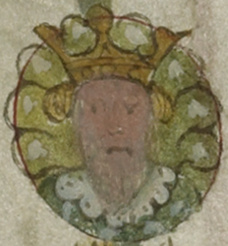In Elizabethan culture
Polydore Vergil says that Greenshield "was greatly renowned neither at home nor in warfare". [2] However, in Elizabethan England he acquired a reputation as a great warrior who is supposed to have led an expedition against the French at Hainaut. Michael Drayton refers to him in Poly-Olbion as "Brute Green-Shield, to whose name we providence impute / Divinely to revive the land's first conqueror, Brute". [3] Greenshield's supposed conquest of Hainaut is also described in Edmund Spenser's The Faerie Queene , in which it is stated that "to repair his father's loss" he fought "a second battle at Henault with Brunchild [Prince of Hainaut] at the mouth of the river Scaldis". [4] The battle turned his green shield red with blood. Greenshield also appears in other works. Brute Greenshield, a play about the king, was performed by the Admiral's Men in 1598, but the text is lost. It may have been written by John Day and Henry Chettle. [5]
In all these works Greenshield's Hainaut expedition becomes the mythical foundation of the British empire, the first foreign venture to expand British influence in the world. Hainaut was also important to Elizabethans because the Earl of Leicester had led Elizabeth's army against the Spanish there in 1579, so "the Greenshield episode thus prefigures Merlin's prophecy that Elizabeth shall 'stretch her white rod over the Belgicke shore'". [4]
This page is based on this
Wikipedia article Text is available under the
CC BY-SA 4.0 license; additional terms may apply.
Images, videos and audio are available under their respective licenses.
